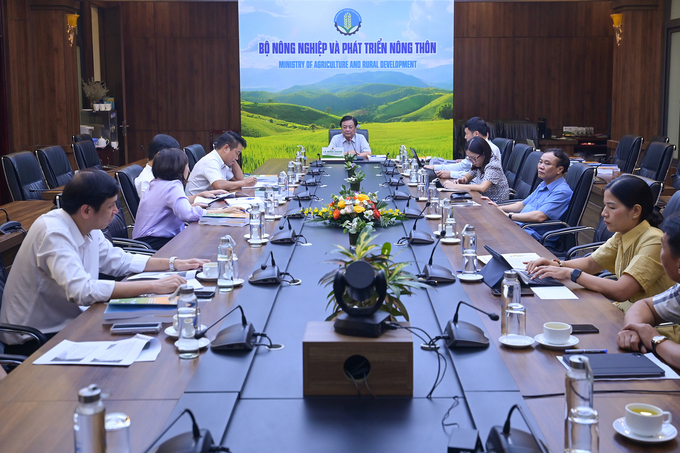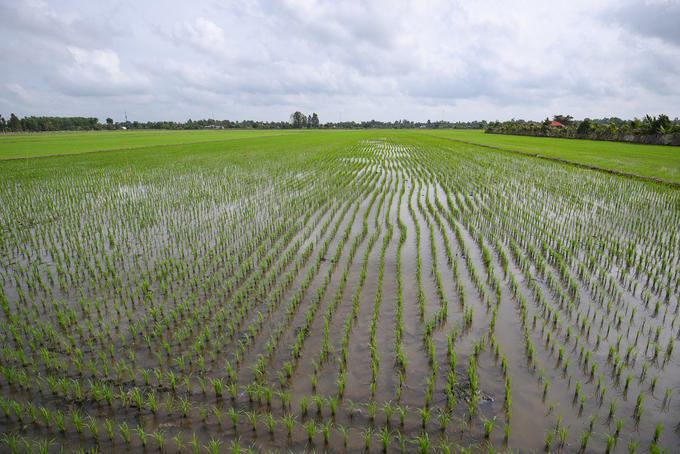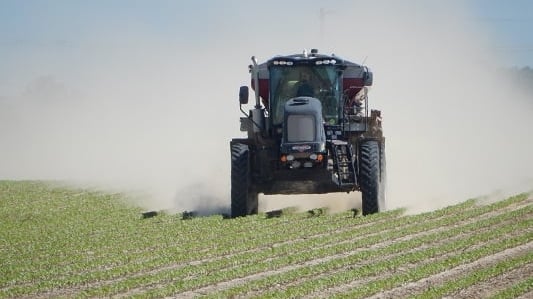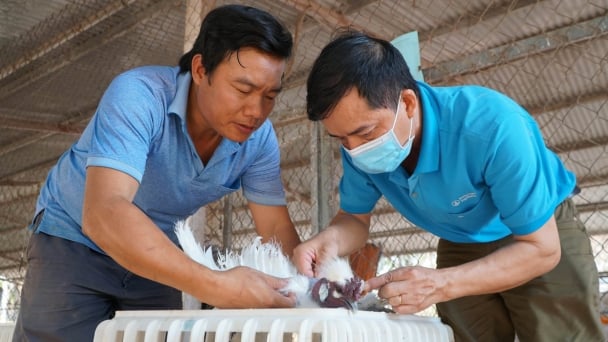May 14, 2025 | 12:29 GMT +7
May 14, 2025 | 12:29 GMT +7
Hotline: 0913.378.918
May 14, 2025 | 12:29 GMT +7
Hotline: 0913.378.918

The Ministry of Agriculture and Rural Development works with ministries and branches on using World Bank capital under a specific mechanism for the 1 million-hectare high-quality rice project. Photo: Tung Dinh.
On August 23, the Ministry of Agriculture and Rural Development collaborated with relevant ministries and departments to apply the World Bank's capital in a specific manner for the Scheme on 1 million hectares of high-quality, low-emission rice that contributes to green growth in the Mekong Delta by 2030, as directed by Deputy Prime Minister Tran Luu Quang.
Specifically, the "Infrastructure and Technical Support for High-Quality, Low-Emission Rice in the Mekong Delta" project (Project) will use WB capital in a specific mechanism.
The Minister of Agriculture and Rural Development Le Minh Hoan, presided over the meeting, which was attended by leaders from pertinent divisions within the Ministry, including the Department of International Cooperation, the Department of Planning, the Department of Legal Affairs, the Department of Crop Production, the Department of Cooperative Economy and Rural Development, and the Management Board of Agricultural Projects. Furthermore, the Ministry of Justice, the Ministry of Planning and Investment, the Ministry of Finance, and the Government Office were represented by leaders and representatives.
Minister Le Minh Hoan made it clear during the meeting that this was a chance for all parties involved in the project to collaborate as a team, listen, share, and propose solutions to develop a project that is representative of the country's image.
According to the chief of the agriculture sector, the meeting's meeting was to resolve specific matters to expedite the completion of the proposal for submission to the government.
Minister Le Minh Hoan stated, "The parties must collaborate to determine the definition of ' special characteristics,' identify potential obstacles to the application of this special mechanism in comparison to the current mechanism, and subsequently suggest solutions."
The Ministry of Agriculture and Rural Development has stated that the project's objective is to create 1 million hectares of rice cultivation areas that are high-quality and low-emission. This will be achieved by reorganizing the production system along the value chain, implementing sustainable farming practices to increase value, and ensuring the sustainable development of the rice industry.
Additionally, the objective is to enhance business efficiency, enhance the income and living standards of rice producers, safeguard the environment, adapt to climate change, and decrease greenhouse gas emissions, all of which will help Vietnam fulfill its international obligations.
The project is scheduled to be executed in two segments and will be implemented in 12 localities within the Mekong Delta region. Under the Sustainable Agriculture Transformation Project in Vietnam (VnSAT), Phase 1, which will be conducted from 2024 to 2025, will concentrate on combining the production of 180,000 hectares.

To effectively implement the 1 million-hectare high-quality, low-emission rice project, investment in technology and infrastructure is needed. Photo: Tung Dinh.
Phase 2, from 2025 to 2030, will encompass an additional 820,000 hectares. The primary objectives of this phase include the completion of infrastructure, the organization of production, the establishment of value chains, and the finalization of the MRV (Measurement, Reporting, and Verification) system. Additionally, the project will focus on investing in new areas.
The project is anticipated to necessitate approximately USD 3 billion in financing by 2030, with USD 1 billion sourced from foreign loans. The World Bank is prepared to contribute approximately USD 330 million.
In this regard, the Ministry of Agriculture and Rural Development (MARD) has evaluated the necessity of a unique mechanism to facilitate the expeditious implementation of the project and unblock foreign loan sources. In addition to guaranteeing advancement, the implementation of a unique mechanism will also guarantee consistency and bolster the national food security objectives, following the needs of partners.
In March 2024, the concept for the "Infrastructure and Technical Support for High-Quality, Low-Emission Rice in the Mekong Delta" project was developed to address the project's development requirements. MARD consented to concentrate on four primary areas of investment: irrigation infrastructure, transport infrastructure associated with irrigation, logistics infrastructure, and comprehensive mechanization support in production.
The project is anticipated to be implemented over a six-year period, from 2026 to 2031, and the World Bank is the anticipated donor, according to Mr. Nguyen Do Anh Tuan, Director of the Department of International Cooperation (MARD).
"The project's overall goal is to invest in infrastructure systems and apply sustainable farming practices in rice production to increase value, develop the rice sector sustainably, improve business efficiency, income, and living standards for rice farmers, protect the environment, adapt to climate change, and reduce greenhouse gas emissions, contributing to Vietnam's international commitments," said Nguyen Do Anh Tuan.
Mr. Tuan explained that the World Bank was chosen as a partner for the project due to its successful experience in implementing the VnSAT project in the past, its status as a strategic partner, and its collaboration with MARD in the development and implementation of the project.
Furthermore, the World Bank can assist in obtaining financial support organizations for emission reduction and high-quality carbon credit markets for rice. The initial financing for this initiative is USD 40 million from the TCAF (Transformative Carbon Asset Facility), in addition to a USD 4 million grant.
The implementation of this project will facilitate infrastructure and technical investments across the 1 million hectares of high-quality, low-emission rice specialization in the Mekong Delta. This will provide the localities involved in the endeavor with economic, social, and environmental benefits.
Economic benefits will result from decreased input costs, while social benefits will include improved income and livelihoods for 1 million agricultural households in the Mekong Delta, as well as an improved international image and reputation for Vietnam.
The project will contribute to the commitment to reduce emissions by 30% by 2030 and attain net zero by 2050 by reducing the use of water, seeds, fertilizers, and pesticides, as well as reducing emissions. This will result in environmental benefits.
In light of these concerns, MARD suggests that ministries, agencies, and localities provide financial support for the initiative through a unique mechanism that utilizes World Bank loans. MARD specifically suggests that the Ministry of Justice guide the procedures and processes for proposing the application of a special mechanism for projects that utilize foreign financing. These projects should be submitted to the Government and the National Assembly for approval.
During the meeting, representatives from the appropriate ministries and agencies conveyed their endorsement of the advancement of rice that is both low-emission and of high quality. From a professional standpoint, the representatives of the agencies raised several issues for discussion to address the challenges and modify the investment content to make it more convenient and proper.
Translated by Linh Linh

(VAN) Vietnam's draft amendment to Decree No. 156 proposes a mechanism for medicinal herb farming under forest canopies, linking economic development to population retention and the sustainable protection and development of forests.

(VAN) In reality, many craft village models combined with tourism in Son La have proven effective, bringing significant economic benefits to rural communities.

(VAN) The international conference titled Carbon Market: International experiences and recommendations for Vietnam was successfully held recently in Ho Chi Minh City.

(VAN) According to the Project on rearranging provincial and communal administrative units, in 2025, the country will have 34 provinces/cities, 3,321 communes, wards, and special zones, and no district-level organization.

(VAN) The vice president of fertilizer with Stone X Group says the Trump administration’s tariffs are impacting fertilizer markets.

(VAN) Resolution 57 offers Vietnam a significant opportunity to narrow the global genetic technology disparity and convert its extensive genetic resources into commercial advantages.

(VAN) The Ministry of Agriculture and Environment will prioritize the implementation of five core and breakthrough solutions in science and technology, in addition to the seven groups of tasks identified in Decision No. 503.